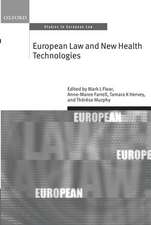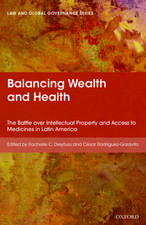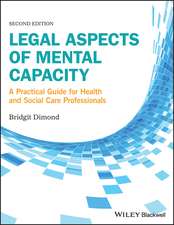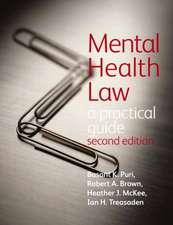Bioethical Decision Making and Argumentation: International Library of Ethics, Law, and the New Medicine, cartea 70
Editat de Pedro Serna, José-Antonio Seoaneen Limba Engleză Hardback – 4 oct 2016
| Toate formatele și edițiile | Preț | Express |
|---|---|---|
| Paperback (1) | 577.22 lei 6-8 săpt. | |
| Springer International Publishing – 14 iun 2018 | 577.22 lei 6-8 săpt. | |
| Hardback (1) | 583.45 lei 6-8 săpt. | |
| Springer International Publishing – 4 oct 2016 | 583.45 lei 6-8 săpt. |
Din seria International Library of Ethics, Law, and the New Medicine
- 5%
 Preț: 347.30 lei
Preț: 347.30 lei -
 Preț: 397.26 lei
Preț: 397.26 lei - 15%
 Preț: 635.31 lei
Preț: 635.31 lei - 18%
 Preț: 942.76 lei
Preț: 942.76 lei - 5%
 Preț: 718.65 lei
Preț: 718.65 lei - 15%
 Preț: 634.68 lei
Preț: 634.68 lei - 15%
 Preț: 637.78 lei
Preț: 637.78 lei -
 Preț: 380.07 lei
Preț: 380.07 lei - 18%
 Preț: 959.98 lei
Preț: 959.98 lei - 15%
 Preț: 641.20 lei
Preț: 641.20 lei - 18%
 Preț: 944.19 lei
Preț: 944.19 lei - 15%
 Preț: 636.80 lei
Preț: 636.80 lei - 15%
 Preț: 643.00 lei
Preț: 643.00 lei - 18%
 Preț: 952.89 lei
Preț: 952.89 lei - 15%
 Preț: 643.48 lei
Preț: 643.48 lei - 18%
 Preț: 954.45 lei
Preț: 954.45 lei - 5%
 Preț: 1095.73 lei
Preț: 1095.73 lei - 15%
 Preț: 645.79 lei
Preț: 645.79 lei - 18%
 Preț: 1111.22 lei
Preț: 1111.22 lei - 15%
 Preț: 643.84 lei
Preț: 643.84 lei - 18%
 Preț: 1227.67 lei
Preț: 1227.67 lei - 18%
 Preț: 953.65 lei
Preț: 953.65 lei - 15%
 Preț: 638.57 lei
Preț: 638.57 lei - 5%
 Preț: 1101.21 lei
Preț: 1101.21 lei
Preț: 583.45 lei
Preț vechi: 686.42 lei
-15% Nou
Puncte Express: 875
Preț estimativ în valută:
111.65€ • 117.40$ • 92.25£
111.65€ • 117.40$ • 92.25£
Carte tipărită la comandă
Livrare economică 17 aprilie-01 mai
Preluare comenzi: 021 569.72.76
Specificații
ISBN-13: 9783319434179
ISBN-10: 3319434179
Pagini: 152
Ilustrații: XV, 143 p.
Dimensiuni: 155 x 235 x 11 mm
Greutate: 0.4 kg
Ediția:1st ed. 2016
Editura: Springer International Publishing
Colecția Springer
Seria International Library of Ethics, Law, and the New Medicine
Locul publicării:Cham, Switzerland
ISBN-10: 3319434179
Pagini: 152
Ilustrații: XV, 143 p.
Dimensiuni: 155 x 235 x 11 mm
Greutate: 0.4 kg
Ediția:1st ed. 2016
Editura: Springer International Publishing
Colecția Springer
Seria International Library of Ethics, Law, and the New Medicine
Locul publicării:Cham, Switzerland
Cuprins
Pedro Serna (Universidad Internacional de La Rioja-Universidade da Coruña, Spain); Foreword.- 1. om L. Beauchamp; Georgetown University, U.S.) Principlism in bioethics.- 2. Diego Gracia (Fundación de Ciencias de la Salud, Madrid, Spain) Values and Bioethics.- 3. Roberto Andorno (University of Zurich, Switzerland); A human rights approach to bioethics.- 4. Carolina Pereira (Universidade da Coruña, Spain); Philosophical Imperialism? A Critical View of North American Principlist Bioethics.- 5. Óscar Vergara (Universidade da Coruña, Spain);Principlism and normative systems.- 6. Pilar Zambrano (University of Navarra, Pamplona, Spain); Types of action and criteria for individualizing them: the case of omission of life-saving care.- 7. José-Antonio Seoane (Universidade da Coruña, Spain); Bioethics, deliberation and argumentation.- 8. Juan Cianciardo (University of Navarra, Pamplona, Spain); Proportionality principle, rights theory and double effect doctrine.- 9. Vicente Bellver Capella (University of Valencia, Spain); International bioethics committees: conditions for a good deliberation.
Textul de pe ultima copertă
This book clarifies the meaning of the most important and pervasive concepts and tools in bioethical argumentation (principles, values, dignity, rights, duties, deliberation, prudence) and assesses the methodological suitability of the main methods for clinical decision-making and argumentation. The first part of the book is devoted to the most developed or promising approaches regarding bioethical argumentation, namely those based on principles, values and human rights. The authors then continue to deal with the contributions and shortcomings of these approaches and suggest further developments by means of substantive and procedural elements and concepts from practical philosophy, normative systems theory, theory of action, human rights and legal argumentation. Furthermore, new models of biomedical and health care decision-making, which overcome the aforementioned criticism and stress the relevance of the argumentative responsibility, and some legal and institutional reflection on international bioethics committees, are included.
Caracteristici
The only book dealing with the unavoidable link between bioethics and legal argumentation Accurately describes and sharply assesses the main methodological approaches for clinical decision-making Contains a collection of plural contributions of international scholars on the decisive and underrated topic of bioethical argumentation














